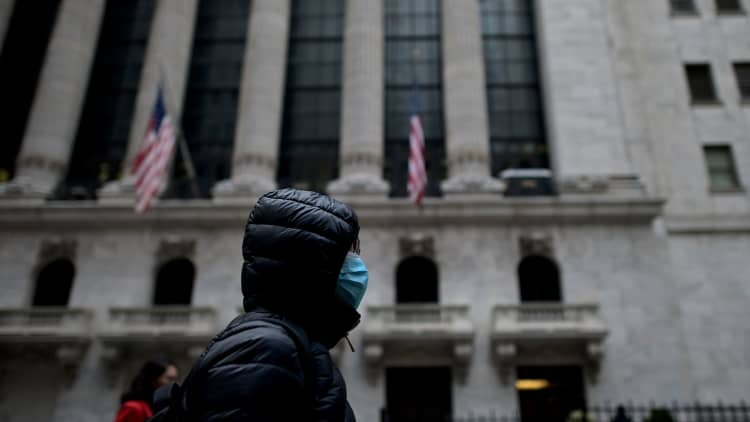
Stocks rose to all-time highs on Thursday after China announced it will halve tariffs on a slew of U.S. products. Strong corporate earnings results and solid economic data also gave the major indexes a boost.
The Dow Jones Industrial Average closed 88.92 points higher, or 0.3%, to 29,379.77. The S&P 500 also climbed 0.3% to close at 3,345.78. The Nasdaq Composite advanced 0.7% to 9,572.15.
Boeing shares led the Dow higher with a 3.6% gain. Microsoft contributed to the advance, rising more than 2%. Communication services and tech were the best-performing sectors in the S&P 500, rising more than 0.8% each.
China announced overnight it will halve tariffs on U.S. imports totaling about $75 billion. China's finance ministry said the tariff cut was timed in conjunction with a U.S. decision last month to halve tariffs on roughly $120 billion worth of Chinese products. Tariffs on some U.S. goods will be cut from 10% to 5%, and from 5% to 2.5% on others, which will take effect on Feb. 14.
That decision was made as part of a broader "phase one" trade deal between China and the U.S. The agreement put the U.S.-China trade war, which had been hurting global growth prospects, on hold. President Donald Trump has said previously a phase-two agreement would be struck at a later date.
The cut also comes after the coronavirus death toll in China rose to 563, with a total of 28,018 cases confirmed as drugmakers race to find a vaccine.
Stocks fell sharply last week amid fears the fast-spreading virus would thwart global economic growth. However, the major U.S. stock indexes have surged this week to recover those losses.
"The sling shot from last Friday's lows has happened quickly, showing us that dip buying remains strong," said Frank Cappelleri, executive director at Instinet.
The Dow and Nasdaq are both up at least 4% week to date while the S&P 500 has gained 3.8%, on pace for its biggest weekly gain since June. The major indexes all dropped at least 1.8% last week.
But JPMorgan strategist Nikolaos Panigirtzoglou is not ready to sound the all-clear just yet.
"Despite this week's equity market rebound we are reluctant to chase short-term momentum," Panigirtzoglou said in a note to clients. "Instead we tactically trim the risk of our portfolio further and recommend a more modest equity overweight."
"Although we recognize that the peak in the rate of increase in the number of new coronavirus cases appears to be behind us as containment measures thus far appear to have been effective, this could change as factories reopen in China and more people come in contact with each other," said the strategist. "In other words, there is a significant risk of an unexpected re-acceleration of new coronavirus cases."
The corporate earnings season continued with Twitter and and Bristol-Myers Squibb releasing their quarterly numbers. Twitter shares jumped more than 15% on its results while Bristol traded higher by 2.3%.
More than 60% of S&P 500 companies have reported earnings thus far, with 71% of them beating analyst expectations, according to FactSet. The overall earnings growth rate has been low, but it is better than the more-than 4% contraction initially expected.
On the data front, weekly jobless claims fell to a nine-month low last week, reaching 202,000. The data follows better-than-forecast private payrolls numbers from ADP and Moody's Analytics.
The positive data, combined with the soothing of coronavirus worries and strong earnings, have pushed money back into equities at the expense of Treasurys. The 10-year Treasury yield traded around 1.65% on Thursday after dropping to as low as 1.5% last week. Yields move inversely to prices.
The U.S. government is scheduled to release its monthly jobs report Friday morning.
"We're back to the bigger picture," said Gregory Faranello, head of rates trading at AmeriVet Securities. "If tomorrow's number is a very constructive number, I don't I don't see 10-year note staying at 1.65%. That's for sure."
—CNBC's Elliot Smith and Michael Bloom contributed to this report.


